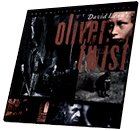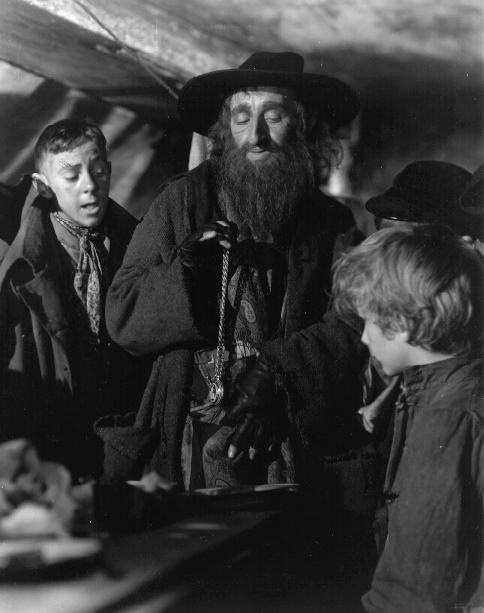

UK drama
1948
bw 116 min.
Director: David Lean
CLV: $49.95 - available
1 disc, catalog # CC1419L
DVD: $39.95 - taking pre-orders now
1 disc, catalog # OLI040DVD
 David Lean followed his prodigious adaptation of Charles Dickens' Great Expectations with this brilliant crystallization of
Dicken's Oliver Twist; or the Parish Boy's Progress. It deploys the cinema's special powers of dash and immediacy
to convey all the venturesomeness and vulnerability of youth. It was Lean who suggested to Sir Arnold Bax, the composer of the
turbulent, eloquent score, that Oliver's theme be rendered on solo piano, to represent "the lonely boy in a world of
bullying adults."
David Lean followed his prodigious adaptation of Charles Dickens' Great Expectations with this brilliant crystallization of
Dicken's Oliver Twist; or the Parish Boy's Progress. It deploys the cinema's special powers of dash and immediacy
to convey all the venturesomeness and vulnerability of youth. It was Lean who suggested to Sir Arnold Bax, the composer of the
turbulent, eloquent score, that Oliver's theme be rendered on solo piano, to represent "the lonely boy in a world of
bullying adults."
Yet from the moment Oliver utters the words that have made him famous--"Please, sir, I want some more"--Lean also celebrates
his steel. With the surgical clarity of his born-moviemaker's vision, he recognized Dickens used Oliver to describe the values
adults should treasure in children and the power children have to protect themselves.
In the opening seconds, as Oliver's exhausted mother pushes on against a storm so she can give birth to Oliver in shelter,
Lean elevates melodrama to poetry--and never lets it drop from the 116-minute running time. He invests audio-visual details
with metaphoric as well as graphic power, until two creaking, thorny briers embody the bending yet unbroken will of the
spasm-racked girl. The first full lightning-lit flash of the workhouse is as eerily sharp as a lithograph plate. The wail of
the baby beside the mother's bed caps the introduction like the drum-clap in an overture.
Dickens believed childhood should be a time of freedom, trust, and tenderness. He also knew that when those qualities
are threatened, kids react with righteous fury. Lean builds the film on these and other dizzying polarities, flinging
viewers between despair and hope. It's black-comic terror to see Oliver and his fellow orphans spy on their warders stuffing
their faces; later, it's a thrill and a delight to see Oliver knocking down that sour undertaker's underling, Noah Claypole,
when Claypole insults his dead mother.
These juxtapositions fuel even richer ones when Oliver escapes to London, where the Artful Dodger delivers him to the notorious
fence, Fagin. After the desperation and pallor of the workhouse lads, Dodger and the rest of Fagin's gang are refreshingly blithe
and hearty. Our affection for them swiftly dissipates when they let Oliver take the fall for a bungled pickpocketing. The film
becomes a fight between the forces of darkness, led by Fagin and his murderous crony, Bill Sykes, and the forces of light, led by
Oliver's benefactor, Mr. Brownlow, and Sykes' repetant girl, Nancy. No movie has better captured Dickens' blend of sensitivity and
violence.
Lean primes the tear ducts and adrenal glands simultaneously; you feel his characters' poverty and want not just in your hearts, but
in your muscles, tendons, and joints. But Lean's mastery of kinesthetic moviemaking is renowned. What's less often acknowledged is his
genius for casting. Eight-year-old John Howard Davies imparts a remarkable lyric presence to Oliver. His curly blond hair and deep,
wide eyes give him the look of a slim cherub--with a streak of insubordination. His fluid emotionality provides counterpoint to the
films dazzling tintypes. Young Anthony Newley approaches perfection as the Dodger [a "common-faced boy" with "all the airs and manners
of a man"]; Robert Newton oozes paranoia and sadism as Sykes; Kay Walsh brings off Nancy's passionate lamentations with fiery eyes
and a pugnacious chin. And Alec Guinness is audaciously funny and sinister as Fagin. His makeup, including an enormous proboscis straight
out of Cruikshank's ilustrations, raised questions of anti-Semitism and enveloped the film in controversy. [In 1951, three years after
the London premiere, it opened in the U.S. with 12-minutes deleted, here restored.] Actually Lean, unlike Dickens. neither labels Fagin
"the Jew" nor depicts him as part of a shady Jewish peddling network.
The director and actor emphasize the gutter connoiseur and misguided mentor within Fagin. When Lean instructs Bax to treat Fagin's lessons
in pickpocketing as "a comic ballet," he planted the seeds for Oliver! Indeed, if you've read the novel or seen the musical, this
movie will make you experience what a New York Herald critic did in 1867 at one of Dickens' public readings: "surprises and new thoughts that
come like revelations of suddenly discovered facts in the lives of old acquaintances."
This new digital transfer was created from a 35mm fine-grain master print made from the original negative and a 35mm soundtrack print.
Index of Films



Buy CLV |
Buy DVD |
View Items |
Checkout
Ordering Information |
Criterion |
Home Vision
|
|
|





